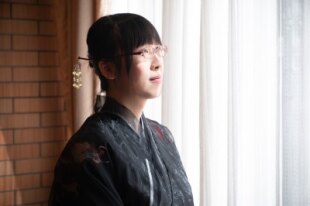Each year, the Writing University conducts interviews with writers while they are in Iowa City participating in the International Writing Program's fall residency. We sit down with authors to ask about their work, their process and their descriptions of home. Today we are talking with Li Kotomi 李琴峰, a novelist, essayist and translator from Taiwan and Japan.

Li Kotomi 李琴峰 (novelist, essayist, translator; Taiwan/ Japan) is the author of Hitorimai, published in 2022 as Solo Dance, Porarisu ga furisosogu yoru [Night of the Shining North Star] (2020), and Higanbana ga saku shima [The Island Where Red Spider Lilies Bloom] (2021). She is the winner of the Akutagawa Prize and the Minister of Education’s Art Encouragement Prize for New Artists, both awarded in Japan, where she is currently based. She writes in Japanese, self-translating her work into Mandarin. Her participation was made possible by a grant from Taiwan’s Ministry of Culture.
1. Do you have a plan or project in mind for your time at the residency?
I do have several projects processing now. One of them is that I’m going to publish my 9th book in Japan in October, so I have to re-check the novel and do some necessary revision. Also I have several columns to write on the newspapers and magazines in Japan.
During the residency, I also have several reading events and panel discussions to work on, both in the Iowa City and in other states. In some events, I will read my own works in several different languages so the audience can feel the beauty of the linguistic diversity. In other events, I will talk about my own works, and Japanese literature. Most of the events are open to public, so please feel free to join!
Nevertheless, I believe the most important thing to do during the residency is to explore the city and the culture here, and meanwhile, to communicate with those writers from all over the world. These experiences will become nourishment in my future writing.
2. What does your daily practice look like for your writing? Do you have a certain time when you write? Any specific routine?
I don’t have any specific routine. I’m definitely not an early bird so I usually write at night or midnight, after the world gets quiet.
3. What are you currently reading right now? Are you reading for research or pleasure?
I’m reading an autobiography written by one of the founders of the IWP, Nieh Hualing, in order to understand the history of this world-famous program. Also, I’m reading some works written by other IWP writers.
To me, all reading is simultaneously both for research and for pleasure.
4. What is something the readers and writers of Iowa City should know about you and/or your work?
I was born in Taiwan, so my first language is Chinese (Mandarin). I began learning Japanese when I was 15, and mastered this fascinating language. I moved to Japan when I was 23, and began writing fiction in Japanese when I was 26. The novel, Solo Dance (now available in English, translated by Arthur Reiji Morris), won a literary prize and became my debut book.
It’s quite difficult to write literary works in a second language. I once believed that it’s an impossible thing to do. But I made it, and I’m so proud of it. I still love my first language, Chinese, but now I prefer to identify myself as a Japanese literature writer.
Also, I’m a lesbian. Most of my stories are featuring LGBTQ+ experiences in Japan and Taiwan, which is a field that I believe there are still many things that must be written. At least for now, the identity of being a member of the queer community is very important to me. It influences the way I live, the way I think, the way I love, the way I see this world, and probably, the way I die.
5. Tell us a bit about where you are from -- what are some favorite details you would like to share about your home?
Everyone knows those cool things from Japan, such as anime, manga, Nintendo Switch and Pokemon. I love these cool things too, and I love Japanese culture and literature. But as a writer, as a woman, and as a queer person, I still have to point out that there are lots of problems to be solved in Japan society -- the patriarchy system, the overtime working, the gender inequality, the homophobia and the transphobia.
As for Taiwan, a tiny island on the Pacific ocean -- I’m proud that it became the first country that achieved the marriage equality in Asia. Although there was strong conservative opposition, they still made it. It’s a victory of human rights, social justice, and love.
**
Thank you so much!